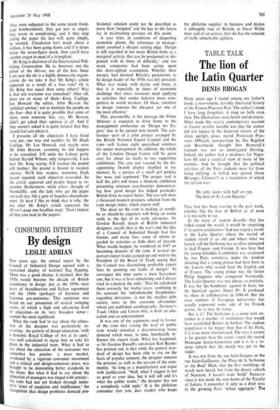All the King's men
THE PRESS BILL GRUNDY
It is, I imagine, easy to get bored with Mr Cecil Harmsworth King, particularly if you are not him; and over the last week or so I reckon I've had my fill. The papers, I feel, have told me more about The Monarch than I wish to know. Except for one thing. They haven't told me the story I'd really like to hear—what effect did Mr King's now-famous utterance have inside the Mirror and the Sun? What did the newspapermen themselves think about it? For when you come to look at it from their point of view, it's a pretty hairy situation.
The Mirror, as we all know, is a highly suc- cessful and popular newspaper. But this is simply because of the skill and judgment of the men who run it daily. Make no mistake about that. It is not successful and popular because of the skill and judgment of Mr King. What, therefore, is the reaction of the staff of the Mirror when Mr King starts using it as a pulpit to thunder out his own version of political hell-fire? Is there perhaps just a suspicion of gloom and despondency around?
Now you will be unsurprised to know that I was not privy to any of the discussions which were almost certainly held in that high build- ing in Holborn before Mr King's immortal words blackened the pages and darkened our doorsteps. But I'm as good as the next man at making a pig's ear of a silk purse, so here goes.
Even the most casual reader of the Mirror must have noticed that over the last few months there's been a lot of exhorting going on. I do not know who wrote those articles, although they smack of the style of Mr Cud- lipp and the sentiments of Mr King, the one trying simultaneously to tart up and damp down the other. And I would guess that the increasing frequency of those articles is an indication of Mr King's growing desire to become a political power in the land, a desire born of his frustration with Mr Harold Wil- son's apparent inability to provide the strong government Mr King sees as our only hope.
If that is so, then I suspect that as the months went by Mr King's discussions with Mr Cudlipp over these matters grew into argu- ments, and the arguments into rows. For Mr Cudlipp is an expert journalist—better than Mr King, I would say—and a pretty shrewd poli- tician—shrewder than Mr King, I would have thought. And I would also have thought that Mr Cudlipp was not too happy about the effect on his paper of Mr King's clarion calls. For exhortations are less exciting than, say, birds in bikinis, which is a low thought and I'm sorry for having entertained it even momen- tarily. Nevertheless, there might be something in it, if the man on Edgeley station is anything to go by; he was standing next to me at Smith's bookstall and as he looked at the front page of the Mirror, he uttered the interesting words, 'Oh, no. Not a-bloody-gain.'
I'm told that the Mirror has received a lot of letters; that only about I per cent agree with Mr King; and that many of them threatened to stop taking the paper if he doesn't behave himself in the future. Even if it's true. I don't suppose it is a particularly worrying situation for the Mirror; five and a quarter million copies .a day gives you'a lot to plaY with. But what • about readers of the Sun?
They were subjected to the same recent front- page bombardment; they got just as angry; they wrote in complaining; and if they stop taking the paper the Sun will, quite simply, be unstuck. Circulation isn't much above a million, it has been going down, and if it drops below the seven-figure mark, then you'll have another organ in need of.a transplant.
Mr King is chairman of the International Pub- lishing Corporation. He is, however, not-the editor of the Mirror, nor of the Sun. Since I am sure the IPC is a highly democratic organi- sation, do we take it that Mr King's article appeared as a result of a free vote? Or is Mr King less equal than some others? Was it that not everyone was consulted? After all, there are so many of them—King, Cudlipp, Lee Howard the editor, John Beavan the `political adviser,' not to mention the people on the Sun—that it is quite possible that some of them, even someone like, say, Mr Beavan, didn't get asked their opinion at all. And if they weren't asked it is quite natural that they should feel sore about it.
I presume all the objections I have listed were put, one way and another, by Mr Hugh Cudlipp, Mr Lee Howard, and maybe even Mr John Beavan, assuming he did happen to be consulted. It'll unite the Labour party behind Harold Wilson; only temporarily, I can hear Mr. King saying. It'll weaken the pound still further; the pound is bound to weaken anyway. We'll lose readers; nonsense. Each reason rejected, each objection overruled. So the article appeared and people began to re- member Rothermere, while others thought of Northcliffe; and the lads who get the paper out each day felt a gust of hopeless disenchant- ment. At least I like to think that is why, the day after Mr King's article appeared, the Mirror's page one headline read : 'Don't believe all that you read in the papers.'







































 Previous page
Previous page